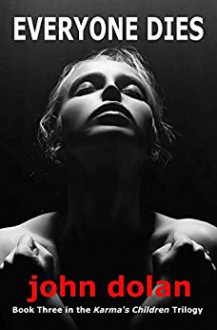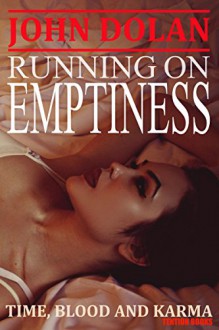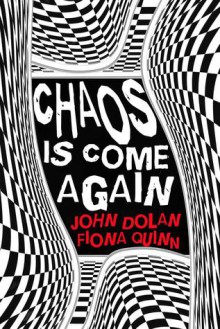
I love John Dolan’s books. I was lucky enough to “discover” him early on in his career, shortly after he published his first novel, Everyone Burns, in 2013. Since then, he has completed two series, the first, composed of four books (the Time, Blood and Karma series) and now, this is the third (and final) novel in his second series, Karma’s Children. And I have read them, reviewed them, and loved them all. Therefore, I approached this, the last novel in the David Braddock universe (well, sort of, as it happens), with trepidation. I wanted to know how this series ended, because there were many issues left hanging after Two Rivers One Stream, but I was also sad that the end was near. Let me assure you, this book is a blast and a more than fitting conclusion to the series.
All these novels share the setting, mostly in Thailand, in Samui (well, some of the action takes place back in England, and there are some other trips and excursions along the way), and although I’ve never visited Thailand and can’t make comparisons, for me the novels have managed to create an atmosphere and a clear picture in my mind, not only of how the place looks like, but of its people, how their society works, and also what it must be like to live there day to day rather than just visiting as a tourist. The novels also share a main character, David Braddock, a British ex-pat/detective/therapist, who has issues of his own aplenty which we slowly discover through the novels. Not all the novels are narrated from the same point of view or take place in the same time-frame and following a chronological order. That gives us the advantage of getting background information and becoming familiar with the characters from a variety of perspectives, and we also become privy to some information that the main character doesn’t know (and that might make us think we are a step ahead, but, boy, are we wrong or what!).
This novel, narrated in first-person by David Braddock, the King of unreliable narrators, gives us another opportunity to share in his witticisms, his philosophising, his bad habits, and his peculiar interactions with those around him (ghosts included). I recently highlighted the first line of a book I read that I said had become one of my new favourites. The first two sentences of this book are also among the most memorable I’ve read (I’ll let you read them yourselves if you fancy the sound of the book. Remember you can check a sample on your usual online store). In case the description above is not enough, I thought I’d share how the book sums up its own content, because it will give you a fair idea of what is to come:
A tale of human mortality comprising a prologue, twenty-eight chapters, two interludes, and a Post Morten Report.
We find Braddock at a low point in his life, following the traumatic events in the previous novel and his very personal loss, and as a result, he starts plotting a revenge that would be complicated even for an experienced assassin, something he is not. His physical condition is also suffering due to his unhealthy lifestyle, but his goal keeps him going and then… I won’t go into the details of the plot, because I don’t want to spoil it for readers, and also because this novel brings together with great flair all the loose threads, not only of this series but of the previous one, and it would be difficult to explain it all to people who are not familiar with the story so far. This is not a novel I’d recommend to people who haven’t read any of the previous ones, because although there is enough background offered to refresh the memories of those who have read them over the years, I think much of the context would be lost if somebody started reading here. I had my suspicions about some of the new plot elements that are revealed in this novel, but I didn’t guess all of them, and I was in awe at how the author managed to weave such a complex story and make it flow naturally. I enjoyed meeting again my favourite characters (some who had not appeared for a while), and I was more than happy with some of the turn of events in the novel (but again, I’ll keep my mouth shut).
I can’t resist sharing a couple of early lines from the book, as a taster:
When one’s focus is on murdering someone, the proximity of female legs —even if aesthetically pleasing— hardly registers.
“Disillusionment should start young. It stops you from becoming bitter when you’re older.”
“Grief is not the presence of some red-clawed monster; looming up at us in the night. In point of fact, it’s not a presence at all. It’s an absence. The absence of something good.”
Well-written, with a dark and sharp sense of humour, clever dialogue, wonderful characters (and some awful ones as well, but wonderful in their awfulness), a fantastic setting, plenty of great quotes (quotes of other books opening each chapter, and eminently quotable lines), and a more-than-satisfying ending, this novel has it all. I keep recommending Dolan’s books to everybody but make sure to read both series in the right order, first Time, Blood and Karma and then Karma’s Children. You can thank me later. Oh, and the author is hard at work, writing the next novel about another character in the Braddock’s universe, and I can’t wait.

 Log in with Facebook
Log in with Facebook 









